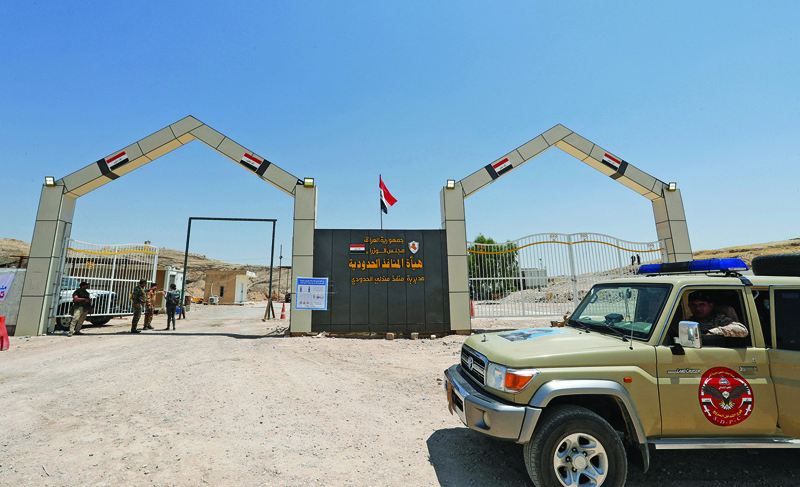 Mandali, Iraq: In this file photo members of the Hashed Al-Shaabi (Popular Mobilization) paramilitary forces stand guard on the Iraqi side of the Mandali crossing on the border with Iran. - AFP
Mandali, Iraq: In this file photo members of the Hashed Al-Shaabi (Popular Mobilization) paramilitary forces stand guard on the Iraqi side of the Mandali crossing on the border with Iran. - AFPBAGHDAD: Along Iraq's borders, a corrupt customs-evasion cartel is diverting billions of dollars away from state coffers to line the pockets of armed groups, political parties and crooked officials. The prime beneficiaries are Iran-linked Shiite paramilitaries that intimidate federal officials who dare obstruct them, sometimes through chillingly specific death threats, a six-month AFP investigation has found.
The network is so well-oiled and entrenched that revenues are parceled out among rival groups with remarkably little friction, part of a parallel system that Iraq's finance minister has described as "state plunder". "It's indescribable," said one Iraqi customs worker. "Worse than a jungle. In a jungle, at least animals eat and get full. These guys are never satisfied."
Like most of the government officials, port workers and importers interviewed for this story, this worker cited threats to his life and asked to speak anonymously. The network they described arises from Iraq's glacially slow bureaucracy, fractious politics, limited non-oil industry and endemic corruption that is itself largely a product of years of chaos in the wake of the 2003 US invasion to topple dictator Saddam Hussein.
Customs provide one of the few sources of state revenues, and to keep disparate groups and tribes happy, many of them close to Iran, entry points are divvied up among them and federal duties largely supplanted by bribes. "There's a kind of collusion between officials, political parties, gangs and corrupt businessmen," Iraq's Finance Minister Ali Allawi said.
'Designed to fail'
Iraq imports a vast majority of its goods-from food and electronics to natural gas-mostly from neighbors Iran and Turkey and from China. Officially, the country of 40 million brought in $21 billion worth of non-oil goods in 2019, the latest year for which full government data is available.
Iraq has five official crossings along its 1,600-kilometre (1,000-mile) border with Iran and one on the nearly 370-km frontier with Turkey, while the single biggest and most lucrative gateway is the port of Umm Qasr in the southern province of Basra. Duties on imports at these points of entry are meant to supplement state revenues from Iraq's huge oil sector-but they don't.
Iraq's import system is infamously outdated and cumbersome, with a 2020 World Bank report citing frustrating delays, high compliance fees and frequent exploitation. "If you want to do it the right way, you end up paying in the four figures for demurrage (docking fees) for a single month" in dollar terms, said an importer based in the region. "It's designed to fail," he said. An informal parallel system rose in its stead, in which parties and paramilitary groups have divided up Iraq's land and sea crossings, said officials, port workers, importers and analysts.
Paramilitary groups
Many of Iraq's entry points are informally controlled by groups within the Hashed Al-Shaabi, a powerful state-sponsored armed network close to Iran, as well as other armed factions, officials confirmed to AFP. The Hashed's members, their allies or their relatives work as border agents, inspectors or police, and are paid by importers who want to skip the official process entirely or get discounts. "If you want a shortcut, you go to the militias or parties," said an Iraqi intelligence agent who has investigated customs evasion.
He said importers effectively tell themselves: "I'd rather lose $100,000 (on a bribe) than lose my goods altogether." The Hashed publicly denies the claims. But sources close to its hardline member groups Asaib Ahl Al-Haq and Kataeb Hezbollah acknowledged that customs posts are indeed parcelled out in the manner alleged. They cited specific harbor berths, land crossings and products that matched what customs officials and the intelligence agent said.
$10,000 a day in bribes
The Mandali crossing on the Iranian border, for example, is run by the Badr Organization, an Iraqi movement founded in Iran, port workers, officials and analysts confirmed. An official there boasted to AFP that a border operative can rake in $10,000 per day in bribes, the bulk of which is distributed to the overseeing armed group and complicit officials.
In other cases, an armed group controls a particular kind of trade. "If I'm a cigarette trader," he said, "I go to Kataeb Hezbollah's economic office in the Jadriyah neighborhood (of Baghdad), knock on the door, and say: 'I want to coordinate with you'." One key figure is always the "mukhalles"-the state customs agent assigned to an incoming shipment who often doubles as a middleman for an armed group.
"There's no such thing as a neutral mukhalles. They're all backed by parties," the intelligence agent said. Once paid-in cash for smaller operations, and by bank wire for larger deals-the mukhalles tampers with paperwork. By misrepresenting the type or amount of goods imported or their value, the customs fee is sharply reduced. One importer said that under-declaring quantities could score a trader discounts of up to 60 percent. - AFP










